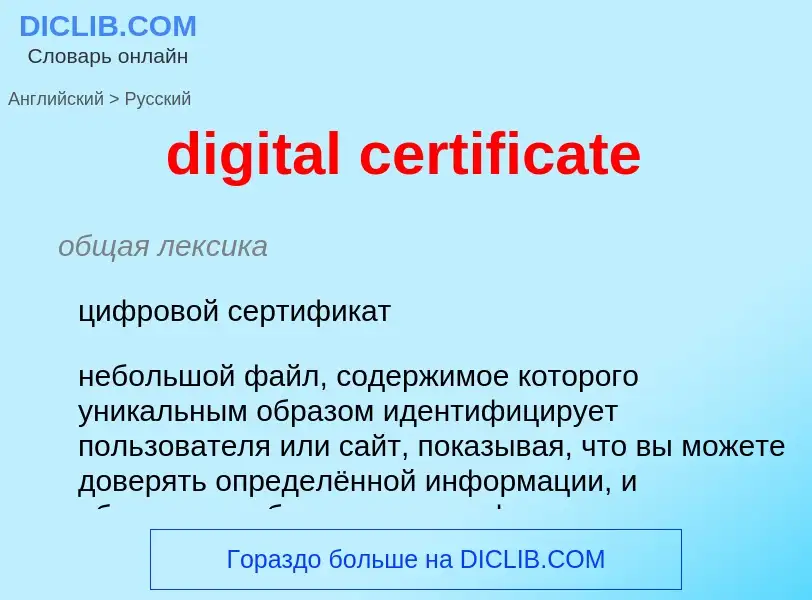Traducción y análisis de palabras por inteligencia artificial ChatGPT
En esta página puede obtener un análisis detallado de una palabra o frase, producido utilizando la mejor tecnología de inteligencia artificial hasta la fecha:
- cómo se usa la palabra
- frecuencia de uso
- se utiliza con más frecuencia en el habla oral o escrita
- opciones de traducción
- ejemplos de uso (varias frases con traducción)
- etimología
digital certificate - traducción al ruso
общая лексика
цифровой сертификат
небольшой файл, содержимое которого уникальным образом идентифицирует пользователя или сайт, показывая, что вы можете доверять определённой информации, и обеспечивая безопасную конфиденциальную связь в Интернете. Он связывает имя объекта, принимающего участие в секретной транзакции (адрес электронной почты или сайта), с открытым ключом. В шифровании с открытыми ключами существует проблема пересылки таких ключей через Интернет. В основе цифровых сертификатов лежит идея цифровой подписи
[ai'dentitisə:tifikət]
синоним
авиация
свидетельство летной пригодности
Definición
Wikipedia
In cryptography, a public key certificate, also known as a digital certificate or identity certificate, is an electronic document used to prove the validity of a public key. The certificate includes information about the key, information about the identity of its owner (called the subject), and the digital signature of an entity that has verified the certificate's contents (called the issuer). If the signature is valid, and the software examining the certificate trusts the issuer, then it can use that key to communicate securely with the certificate's subject. In email encryption, code signing, and e-signature systems, a certificate's subject is typically a person or organization. However, in Transport Layer Security (TLS) a certificate's subject is typically a computer or other device, though TLS certificates may identify organizations or individuals in addition to their core role in identifying devices. TLS, sometimes called by its older name Secure Sockets Layer (SSL), is notable for being a part of HTTPS, a protocol for securely browsing the web.
In a typical public-key infrastructure (PKI) scheme, the certificate issuer is a certificate authority (CA), usually a company that charges customers to issue certificates for them. By contrast, in a web of trust scheme, individuals sign each other's keys directly, in a format that performs a similar function to a public key certificate. In case of key compromise, a certificate may need to be revoked.
The most common format for public key certificates is defined by X.509. Because X.509 is very general, the format is further constrained by profiles defined for certain use cases, such as Public Key Infrastructure (X.509) as defined in RFC 5280.

